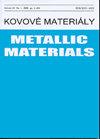Effects of supersonic fine particle bombardment on the microstructure and properties of an Mg-1.8Zn-0.5Zr-1.5Gd biological magnesium alloy
IF 0.7
4区 材料科学
Q4 MATERIALS SCIENCE, MULTIDISCIPLINARY
引用次数: 0
Abstract
With the help of supersonic fine particle bombardment technology, a gradient nanostructure with a certain layer depth was constructed on the surface of an Mg-1.8Zn-0.5Zr-1.5Gd biological magnesium alloy. The effects of bombardment time on the microstructure, mechanical properties, and corrosion resistance of the gradient nanostructure were investigated. The results showed that the layer depth and surface roughness of the gradient nanostructures increased with an increase in the bombardment time, and the corresponding mechanical properties and corrosion resistance first increased and then decreased with an extension of the bombardment time. When the bombardment time was 30 s, the alloy had good mechanical properties and corrosion resistance. Its tensile strength, yield strength, elongation, and static corrosion rate were 299.1 ± 2.2 MPa, 264.4 ± 1.5 MPa, 36.8 ± 1.3 %, and 0.307 ± 0.015 mm y − 1 , respectively. The results of the 120-h immersion experiment in simulated human body fluids showed that the average corrosion rate of the alloy first decreased, then increased, and finally decreased with an extension of the immersion time and finally tended超声细颗粒轰击对Mg-1.8Zn-0.5Zr-1.5Gd生物镁合金组织和性能的影响
利用超声细粒子轰击技术,在Mg-1.8Zn-0.5Zr-1.5Gd生物镁合金表面构建了具有一定层深的梯度纳米结构。研究了轰击时间对梯度纳米结构的微观结构、力学性能和耐蚀性的影响。结果表明:随着轰击时间的增加,梯度纳米结构的层深和表面粗糙度增大,相应的力学性能和耐蚀性随轰击时间的延长先增大后减小;当轰击时间为30 s时,合金具有良好的力学性能和耐腐蚀性。其抗拉强度为299.1±2.2 MPa,屈服强度为264.4±1.5 MPa,伸长率为36.8±1.3%,静态腐蚀率为0.307±0.015 mm y−1。在模拟人体体液中浸泡120 h的实验结果表明,合金的平均腐蚀速率随着浸泡时间的延长先降低后升高,最后降低并趋于平缓
本文章由计算机程序翻译,如有差异,请以英文原文为准。
求助全文
约1分钟内获得全文
求助全文
来源期刊

Kovove Materialy-Metallic Materials
MATERIALS SCIENCE, MULTIDISCIPLINARY-METALLURGY & METALLURGICAL ENGINEERING
CiteScore
1.20
自引率
14.30%
发文量
36
审稿时长
3 months
期刊介绍:
Kovove Materialy - Metallic Materials is dedicated to publishing original theoretical and experimental papers concerned with structural, nanostructured, and functional metallic and selected non-metallic materials. Emphasis is placed on those aspects of the science of materials that address:
the relationship between the microstructure of materials and their properties, including mechanical, electrical, magnetic and chemical properties;
the relationship between the microstructure of materials and the thermodynamics, kinetics and mechanisms of processes;
the synthesis and processing of materials, with emphasis on microstructural mechanisms and control;
advances in the characterization of the microstructure and properties of materials with experiments and models which help in understanding the properties of materials.
 求助内容:
求助内容: 应助结果提醒方式:
应助结果提醒方式:


